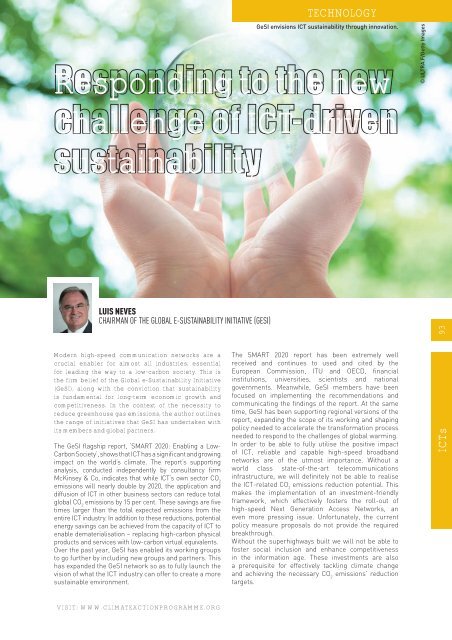Climate Action 2009-2010
You also want an ePaper? Increase the reach of your titles
YUMPU automatically turns print PDFs into web optimized ePapers that Google loves.
TECHNOLOGY<br />
GeSI envisions ICT sustainability through innovation.<br />
Responding to the new<br />
challenge of ICT-driven<br />
sustainability<br />
© ULTRA.F/Getty Images<br />
Luis Neves<br />
Chairman of the Global e-SuStainability initiative (GeSi)<br />
Modern high-speed communication networks are a<br />
crucial enabler for almost all industries, essential<br />
for leading the way to a low-carbon society. This is<br />
the firm belief of the Global e-Sustainability Initiative<br />
(GeSI), along with the conviction that sustainability<br />
is fundamental for long-term economic growth and<br />
competitiveness. In the context of the necessity to<br />
reduce greenhouse gas emissions, the author outlines<br />
the range of initiatives that GeSI has undertaken with<br />
its members and global partners.<br />
The GeSI flagship report, ‘SMART 2020: Enabling a Low-<br />
Carbon Society’, shows that ICT has a significant and growing<br />
impact on the world’s climate. The report’s supporting<br />
analysis, conducted independently by consultancy firm<br />
McKinsey & Co, indicates that while ICT’s own sector CO 2<br />
emissions will nearly double by 2020, the application and<br />
diffusion of ICT in other business sectors can reduce total<br />
global CO 2<br />
emissions by 15 per cent. These savings are five<br />
times larger than the total expected emissions from the<br />
entire ICT industry. In addition to these reductions, potential<br />
energy savings can be achieved from the capacity of ICT to<br />
enable dematerialisation – replacing high-carbon physical<br />
products and services with low-carbon virtual equivalents.<br />
Over the past year, GeSI has enabled its working groups<br />
to go further by including new groups and partners. This<br />
has expanded the GeSI network so as to fully launch the<br />
vision of what the ICT industry can offer to create a more<br />
sustainable environment.<br />
The SMART 2020 report has been extremely well<br />
received and continues to used and cited by the<br />
European Commission, ITU and OECD, financial<br />
institutions, universities, scientists and national<br />
governments. Meanwhile, GeSI members have been<br />
focused on implementing the recommendations and<br />
communicating the findings of the report. At the same<br />
time, GeSI has been supporting regional versions of the<br />
report, expanding the scope of its working and shaping<br />
policy needed to accelerate the transformation process<br />
needed to respond to the challenges of global warming.<br />
In order to be able to fully utilise the positive impact<br />
of ICT, reliable and capable high-speed broadband<br />
networks are of the utmost importance. Without a<br />
world class state-of-the-art telecommunications<br />
infrastructure, we will definitely not be able to realise<br />
the ICT-related CO 2<br />
emissions reduction potential. This<br />
makes the implementation of an investment-friendly<br />
framework, which effectively fosters the roll-out of<br />
high-speed Next Generation Access Networks, an<br />
even more pressing issue. Unfortunately, the current<br />
policy measure proposals do not provide the required<br />
breakthrough.<br />
Without the superhighways built we will not be able to<br />
foster social inclusion and enhance competitiveness<br />
in the information age. These investments are also<br />
a prerequisite for effectively tackling climate change<br />
and achieving the necessary CO 2<br />
emissions’ reduction<br />
targets.<br />
ICTs 93<br />
VISIT: WWW.CLIMATEACTIONPROGRAMME.ORG












